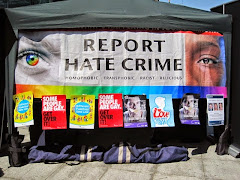From Wikipedia, the free encyclopaedia:
Ross Parker (17 August 1984 – 21 September 2001), from Peterborough, East Anglia was a 17-year-old English male murdered in an unprovoked racially motivated crime.
He was stabbed to death and beaten with a hammer by a gang of youths of Pakistani background who were seeking a white male to attack. The incident occurred ten days after the 11 September attacks.
In December 2002, Shaied Nazir, Ahmed Ali Awan, and Sarfraz Ali were all found guilty of Parker's murder in unanimous verdicts and sentenced to life imprisonment, receiving minimum terms ranging from 16 to 18 years. A fourth defendant, Zairaff Mahrad, was cleared of murder and manslaughter.
Parker's murder is cited as an example of the lack of attention the media and society give to white targets of racist attacks compared to the coverage given to attacks on ethnic minorities, with organisations such as the BBC and some newspaper journalists later admitting failing to cover the case sufficiently.
In December 2002, Shaied Nazir, Ahmed Ali Awan, and Sarfraz Ali were all found guilty of Parker's murder in unanimous verdicts and sentenced to life imprisonment, receiving minimum terms ranging from 16 to 18 years. A fourth defendant, Zairaff Mahrad, was cleared of murder and manslaughter.
Parker's murder is cited as an example of the lack of attention the media and society give to white targets of racist attacks compared to the coverage given to attacks on ethnic minorities, with organisations such as the BBC and some newspaper journalists later admitting failing to cover the case sufficiently.
It is also suggested the case demonstrates how society has been forced to redefine racism so as to no longer exclude white victims.
Reporting
The media was criticised for their lack of coverage of the Ross Parker case in comparison to similar racist murders occurring in the UK, such as the case of Anthony Walker and that of Stephen Lawrence. The BBC later admitted that "it was a mistake not to report the case of Ross Parker more extensively", noting the "stark" parallels with the Walker case though also suggesting the story had been "squeezed out" by other news such as a conviction of the killer of Danielle Jones. However it was noted that in hindsight that the crime was "worthy of coverage" "by any standards".
Yasmin Alibhai-Brown and Kelvin MacKenzie expressed similar sentiments, with the latter criticising newspapers including his own employer, The Sun.
Others have noted that the lack of coverage is not simply a media issue. Peter Fahy, the spokesman on race issues for the Association of Chief Police Officers stated:
A lot of police officers and other professionals feel almost the best thing to do is to try and avoid [discussing such attacks] for fear of being criticised. This is not healthy.
Montague suggests the lack of police appeals in cases involving white victims may be a cause of the lack of media coverage.
The newspaper which did cover the case more extensively faced some criticism. The Government office for the East of England produced a report by Dr Roger Green examining race relations in Peterborough. The document suggested that the Peterborough Evening Telegraph had a history of insensitivity and coverage of the case was "possibly adding to any climate of racial and communal unrest". The criticism of the paper was rejected by a senior police officer and an Asian community leader, both of whom praised its handling of the case.
Impact
Parker's murder lead to increased racial tensions in Peterborough. There were problems at Parker's school where three Asian pupils were suspended for an attack on a pupil. A number of taxi firms stopped work early in the days after the attack in fear of reprisals. In November 2001 Home Secretary David Blunkett banned all marches in Peterborough for three months as it was feared violence would be caused by the Anti-Nazi League and National Front who both sought to hold protests on the same day.
Parker's death also had a major impact on his family. His mother, Davinia, was unable to work for three months after Parker's funeral and came close to attempting suicide on a number of occasions. Parker's room was left untouched even a year after the incident, with his parents unable to bring themselves to tidy it, describing it as a place they "feel close to Ross".
As a result of the murder of Parker, local authorities set up a unity scheme, whereby gang members from different communities were trained as youth workers in order to ease racial tensions and reduce violence. However, some problems still persisted, with racist graffiti painted near the murder scene two years after the incident reading "no go area for whites", "Paki powa" and "death to whites".
Some, such as Mark Easton cite the Parker case as demonstrating how society has been forced to redefine racism and discard the erroneous definition of "prejudice plus power" – a definition which had only allowed ethnic minorities to be victims.
Parker's murder lead to increased racial tensions in Peterborough. There were problems at Parker's school where three Asian pupils were suspended for an attack on a pupil. A number of taxi firms stopped work early in the days after the attack in fear of reprisals. In November 2001 Home Secretary David Blunkett banned all marches in Peterborough for three months as it was feared violence would be caused by the Anti-Nazi League and National Front who both sought to hold protests on the same day.
Parker's death also had a major impact on his family. His mother, Davinia, was unable to work for three months after Parker's funeral and came close to attempting suicide on a number of occasions. Parker's room was left untouched even a year after the incident, with his parents unable to bring themselves to tidy it, describing it as a place they "feel close to Ross".
As a result of the murder of Parker, local authorities set up a unity scheme, whereby gang members from different communities were trained as youth workers in order to ease racial tensions and reduce violence. However, some problems still persisted, with racist graffiti painted near the murder scene two years after the incident reading "no go area for whites", "Paki powa" and "death to whites".
Some, such as Mark Easton cite the Parker case as demonstrating how society has been forced to redefine racism and discard the erroneous definition of "prejudice plus power" – a definition which had only allowed ethnic minorities to be victims.
Others such as Alibhai-Brown condemned the double standards of racial equality campaigners in relation to the case, suggesting black activists should "march and remember victims like Ross Parker", stating "our values are worthless unless all victims of these senseless deaths matter equally". She went on to write that "to treat some victims as more worthy of condemnation than others is unforgivable and a betrayal of anti-racism itself".


No comments:
Post a Comment